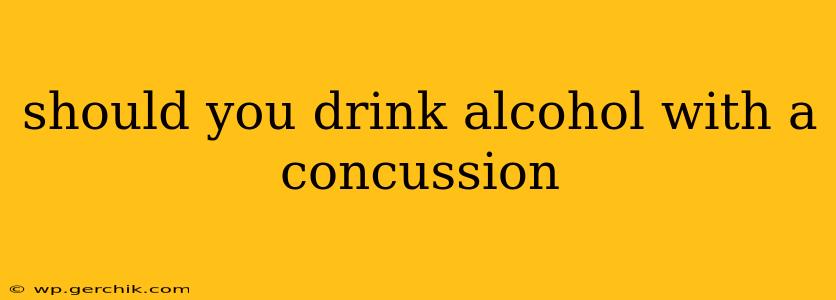Should You Drink Alcohol With a Concussion? A Definitive No.
A concussion, also known as a mild traumatic brain injury (mTBI), is a serious injury that requires careful management and rest. The short answer to the question, "Should you drink alcohol with a concussion?" is a resounding no. Consuming alcohol after a concussion can significantly hinder the healing process and potentially worsen the symptoms. Let's explore why.
Why Alcohol is Detrimental After a Concussion
Alcohol is a central nervous system depressant. This means it slows down brain activity. After a concussion, your brain is already vulnerable and trying to repair itself. Adding alcohol to the mix further depresses brain function, potentially leading to:
- Prolonged recovery: Alcohol can interfere with the brain's natural healing process, extending the duration of your symptoms and recovery time.
- Increased risk of complications: Studies suggest that alcohol consumption after a concussion may increase the risk of post-concussion syndrome (PCS), a condition characterized by persistent symptoms like headaches, dizziness, and cognitive difficulties.
- Exacerbated symptoms: Alcohol can worsen existing concussion symptoms such as headaches, nausea, dizziness, and cognitive impairment (difficulty concentrating, memory problems). It can even trigger or worsen sleep disturbances, a common problem after a concussion.
- Medication interactions: If you're taking medication for pain or other concussion-related symptoms, alcohol can interact negatively, reducing the medication's effectiveness or causing harmful side effects.
- Dehydration: Alcohol is a diuretic, meaning it increases urine production. This can lead to dehydration, which can further negatively impact brain function and recovery.
What Happens to Your Brain After a Concussion?
Understanding the effects of a concussion on the brain helps to illustrate why alcohol is so detrimental. A concussion causes microscopic damage to the brain cells and disrupts their normal function. The brain needs time and rest to repair this damage. Alcohol interferes with this crucial healing process.
How Long Should You Avoid Alcohol After a Concussion?
There's no set timeframe for avoiding alcohol after a concussion, as recovery varies from person to person. However, it's generally recommended to abstain completely from alcohol until you've been fully cleared by a medical professional. This often involves a thorough neurological examination and assessment of your symptoms. Rushing the recovery process by drinking alcohol could have long-term consequences.
What About Other Substances?
This advice extends beyond just alcohol. Other substances like illicit drugs, excessive caffeine, and even certain over-the-counter medications should be avoided or used only under the guidance of your doctor after a concussion.
What Should You Do Instead?
Focus on rest, hydration, and following your doctor's recommendations. This might include:
- Getting plenty of sleep: Prioritize sleep to allow your brain to heal.
- Staying hydrated: Drink plenty of water.
- Following a healthy diet: Nourish your body with nutritious foods.
- Avoiding strenuous activity: Rest your brain and body.
- Managing pain: Follow your doctor's advice on pain management.
In Conclusion: Avoiding alcohol and other potentially harmful substances is crucial for a safe and effective recovery from a concussion. Always consult with a medical professional for guidance and to ensure you're taking the necessary steps for a complete recovery. Your health and long-term well-being are paramount.
